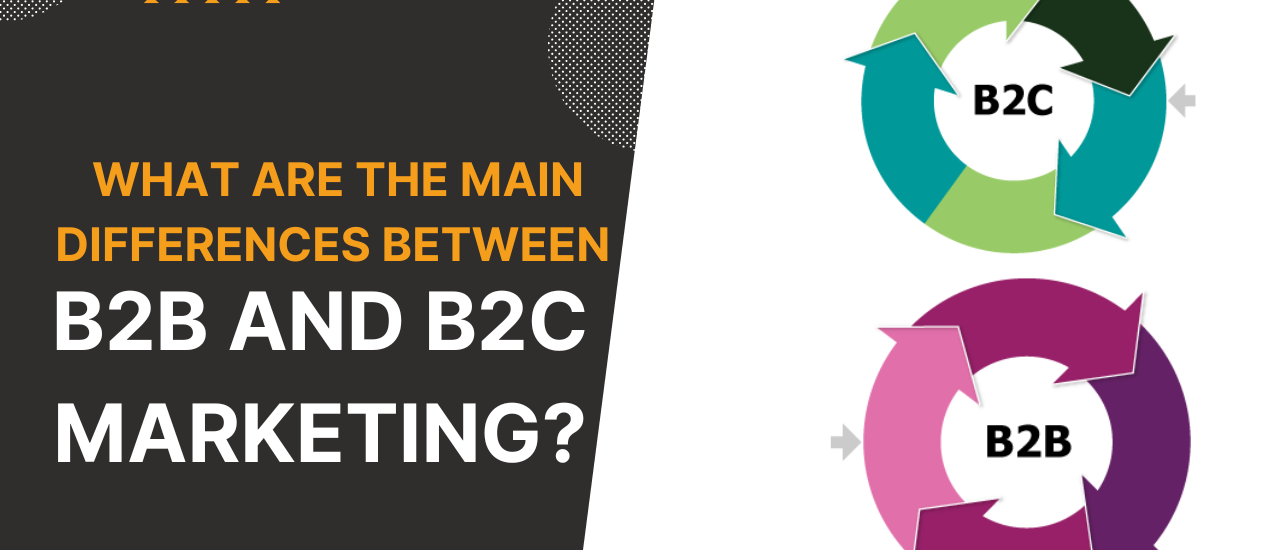In the dynamic landscape of modern business, marketing strategies play a pivotal role in shaping success. Whether it’s targeting other businesses (B2B) or individual consumers (B2C), understanding the fundamental disparities between these two approaches is essential for crafting effective campaigns. While both share the overarching goal of driving sales and fostering brand loyalty, the methodologies, target audiences, and messaging tactics employed by B2B and B2C marketing differ significantly.
Let’s delve into the main divergences between B2B and B2C marketing to illuminate their unique characteristics and challenges.
Target Audience:
B2B Marketing: Business-to-business marketing primarily targets organizations, focusing on building relationships with other companies rather than individual consumers. The audience comprises decision-makers, procurement managers, and stakeholders within businesses.
B2C Marketing: In contrast, business-to-consumer marketing directly engages individual customers. The target audience encompasses diverse demographics, including age, gender, income level, and lifestyle preferences.
Purchase Decision Process:
B2B Marketing: The decision-making process in B2B transactions is often complex and involves multiple stakeholders. Purchases are usually based on rational considerations such as cost-effectiveness, quality, and long-term value. Relationship-building and trust play a crucial role in influencing buying decisions.
B2C Marketing: Conversely, the purchase decision process in B2C transactions tends to be more straightforward and emotionally driven. Consumers are influenced by factors like brand perception, peer recommendations, and personal preferences. Impulse buying and emotional appeal often sway purchase decisions in the B2C realm.
Sales Cycle Length:
B2B Marketing: B2B sales cycles are typically longer and more intricate compared to B2C. Building trust, nurturing leads, and negotiating contracts can prolong the sales process, requiring marketers to adopt strategies for sustained engagement over an extended period.
B2C Marketing: In contrast, B2C sales cycles are generally shorter, with transactions often occurring within a single interaction. Marketers focus on creating immediate gratification and facilitating seamless purchase experiences to capitalize on consumer impulses.
Content and Messaging:
B2B Marketing: Content in B2B marketing tends to be more technical and informational, catering to the specific needs and pain points of businesses. Case studies, whitepapers, and product demonstrations are commonly used to showcase expertise and provide solutions to complex business challenges.
B2C Marketing: B2C content leans towards entertainment, storytelling, and visual appeal to capture consumers’ attention and evoke emotions. Marketers leverage social media, video content, and influencer partnerships to create relatable narratives and engage with their audience on a personal level.
Relationship Building:
B2B Marketing: Building strong, long-term relationships is a cornerstone of B2B marketing. Marketers invest in personalized communication, networking events, and account management to foster trust and loyalty among business clients.
B2C Marketing: While relationships are important in B2C marketing, the emphasis is more on creating positive brand experiences and delivering exceptional customer service. Brands strive to cultivate a community of loyal customers through rewards programs, personalized recommendations, and responsive customer support.
Channel Selection:
B2B Marketing: B2B marketers often rely on a mix of traditional and digital channels such as email marketing, industry publications, trade shows, and professional networking platforms like LinkedIn to reach decision-makers and influencers within target businesses.
B2C Marketing: In the B2C realm, marketers leverage a broader array of channels including social media platforms, search engine optimization (SEO), online marketplaces, and mobile apps to connect with individual consumers across various touchpoints and devices.
Measuring Success
B2B Marketing: Success in B2B marketing is typically measured by metrics such as lead generation, conversion rates, customer acquisition cost (CAC), customer lifetime value (CLV), and return on investment (ROI) from marketing campaigns.
B2C Marketing: Key performance indicators (KPIs) in B2C marketing often include metrics like website traffic, click-through rates (CTR), conversion rates, customer retention, brand sentiment, and social media engagement.
In conclusion, while B2B and B2C marketing share the overarching goal of driving sales and fostering brand loyalty, they diverge significantly in terms of target audience, purchase decision process, sales cycle length, content and messaging, relationship-building strategies, channel selection, and metrics for success. Recognizing these core differences is essential for marketers to tailor their strategies effectively and achieve optimal results in either B2B or B2C contexts. By understanding the unique characteristics and challenges of each approach, businesses can navigate the complexities of modern marketing landscapes with confidence and precision.





